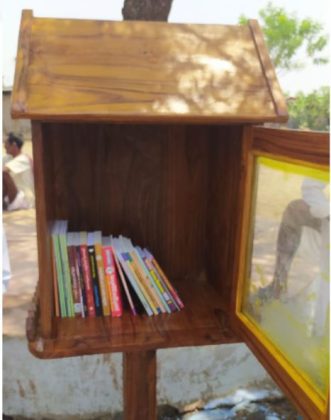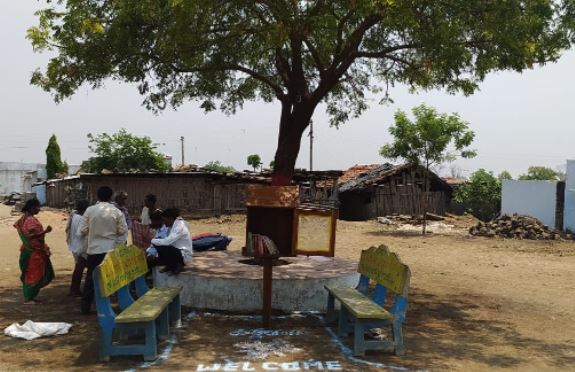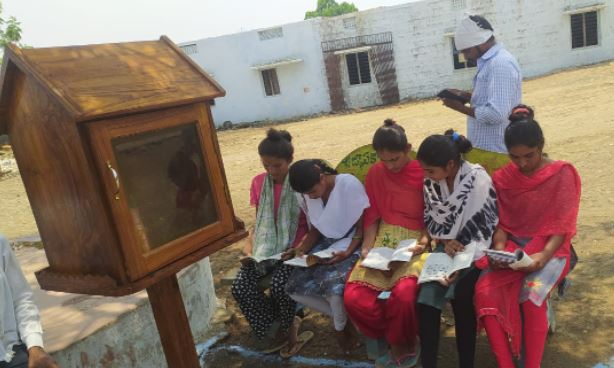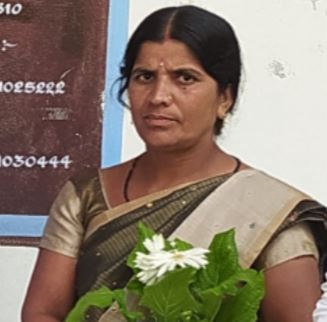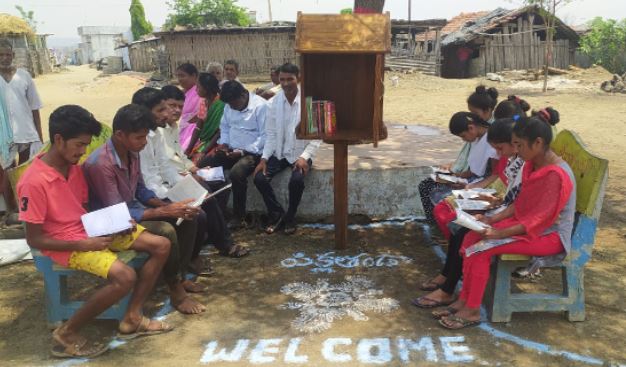
Tiny box with a glass door: A library is changing this tribal village's face

Pikla Thanda, a little-known tribal habitation in Telangna, is suddenly in the news. A gram panchayat of 1,000 people in Kumuram Bheem-Asifabad district, the Thanda (tribal habitation) normally finds little space outside the revenue records. Located far away from the district headquarters or any town worth its name, the village is untouched by the fast-changing urban culture in one of the wealthiest states of India.
Literacy in the village is low and unemployment high. Youth while away their time wandering around the forests and fields. Most villagers have not even seen a newspaper. Most people are also not much interested in catching up with the world outside. There thus was no reason for the village, which is home to two major tribes Lambada and Gond, to be in the news.
But now, suddenly, the village hit headlines for having established a people-friendly, eco-friendly library and probably India’s smallest library, last week. Thanks to sarpanch Banoth Mangibhai Kishan’s initiative, the district administration chose the village to set up a tiny library for the benefit of students and public.
The open-air set-up
The library is nothing but a small wooden box with a glass door, fixed on a long wooden post. A creative marvel, the library houses a variety of books. One can find books for children along with those on Telangana history, literature, Niti Satakas, guides for competitive exams and English Grammar. A couple of books written by Sri Sri and Kaloji, household names in Telugu states, are also on display.
Banoth Haritha, who completed her teacher training course, was happy that she had found a much-wanted book useful for teachers’ recruitment exam preparation. “I cannot buy the book because we are poor. I can’t even borrow it from friends as we are in a remote area. Though small, this library is immensely useful,” Harith said.
Every day, from dawn to dusk, the tiny library lay stationed at Rachabanda, a platform at the centre of the village. Two benches are arranged under the shade of a tree for visitors. Anybody can come and the read a book. In the evening, the library is shifted to the local gram panchayat office. Lending of books is also expected to start soon.
The low–cost library can be carried to any place in the village effortlessly. A staff member of the gram panchayat is entrusted with the responsibility.
Enthusiastic villagers
The mobile library has become a centre of attraction in the village. Many villagers, who had not seen a book other than their rations cards during their lifetime, are experiencing the feel of the printed book for the first time, though they don’t know what is there in these books.
The villagers responded to the opening of the library with great enthusiasm. They cleared and cleaned the place chosen to station the library and a rangoli was drawn to welcome it.
The tiny library has created a commotion in the village, admitted Borlakunta Manish, gram panchayat secretary. “Ever since its inception a week ago, almost all male members of the village have visited the library, opened the box, and inquired about the books,” Manish told The Federal.
The library has also captured the attention of students and youth. They visit the library and spend some time talking about books. “This is exactly what we were thinking of achieving,” said a senior official who was involved in the conceptualisation of the library.
“We want to shatter the conventional concept of the library in a backward and tribal-dominant areas. We find a curious lack of interest in education among the people and youth. They have no role models around to inspire them. The standard of education is so poor that even a student of the seventh standard cannot read Telugu well and recognize English Alphabet.
They hardly know any book beyond the ones they have in their school bags. Out of 1,000 people in the village, we found only 176 literates with a handful of them educated, but whose standard was below par. The library is a minor attempt to bring about improvement in the situation, first by creating a love for books and inculcating reading habits among the students,” the official said.
Cost-effective model
According to the official, a conventional library, which requires a pucca building, many bookshelves, chairs and other paraphernalia, is not suitable in this area “This is an expensive proposition costing about Rs 5-6 lakh. Our tiny library is cost-effective and the cost can be met easily by the gram panchayat. Pikla Thanda library was set up at a meagre cost of Rs 12,000,” the official, who did not want to be identified, explained.
Sarpanch Banoth Mangibai Kishan is elated by the buzz the library is creating. When the officials put forth the proposition, it was she who insisted that such a library be set up in her village first.
“I am inspired by our collector and additional collector sir. Sirs told us about the benefits of having a good education. Our children need to be educated. I believe this library would create interest in education among the children,” Mangibai, who herself is illiterate, said. Since she can’t speak Telugu, she speaks through her husband.
She dreams of a day when the village is full of activity and the local primary school has a large number of students.
JR Prasad, the Mandal Panchayat Development Officer (MPDO), said the public response to the tiny open-air library was encouraging.
The officials have a plan to replicate this cost-effective model in all tribal habitations soon. “The district administration is negotiating with the NGO Pratham to make available books that meet the local requirements and demands,” another official said.
The history of the Library Movement in Telangana like elsewhere is replete with fascinating stories and amazing creative ideas. The inextinguishable love for books drove certain people on the rough paths to carry the book to people living in remote unlettered areas. In the process, every conceivable mobile object such as camel, donkey, bullock cart, cycle, pushcart, two-wheeler, three-wheeler, vans, bus, etc., has become a carrier of library one time or another.
The pushcart library-cum-shop launched by Md Sadik, a writer from Hyderabad, is legendary in Telangana. Sadik has embarked on a mission to set up 1,000 libraries in 1,000 villages in 1,000 days. The mission was reportedly hit by the Covid-19 pandemic, halfway. Now, the Pikla Thanda model is expected to herald a new chapter in the library movement of Telangana, especially in rural areas. The 29th state of India, if all goes well, will become a state with a library in every habitation.


